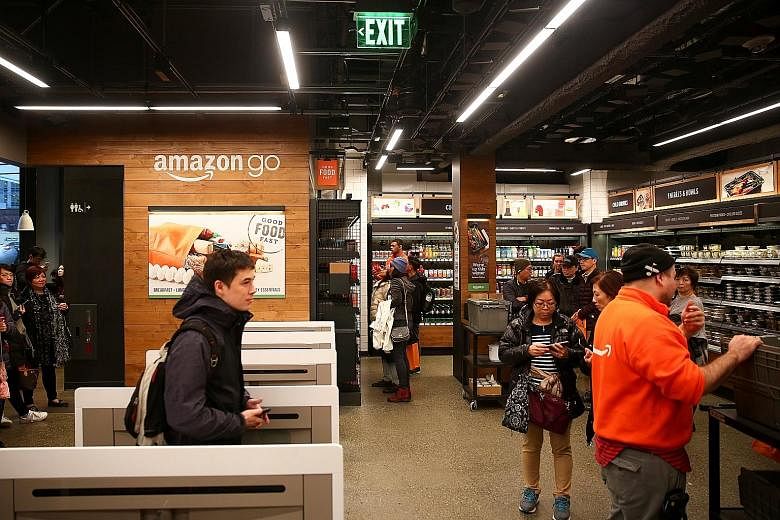SEATTLE • To see what it is like inside stores where sensors and artificial intelligence have replaced cashiers, shoppers only have to trek to Amazon Go, the Internet retailer's experimental convenience shop in downtown Seattle.
Soon, though, more technology-driven businesses like Amazon Go may be coming to them.
A global race to automate stores is under way among several of the world's top retailers and small tech start-ups, amid a drive to shave labour costs and improve the shopping experience. They are also trying to prevent Amazon from dominating the physical retail world as it does online shopping.
Walmart, the world's largest retailer, is testing robots in dozens of its locations to reduce some tedious tasks that can eat up a worker's time. The robots, which look like giant wheeled luggage bags, roll up and down the aisles looking for shelves where cereal boxes are out of stock and items like toys are mislabelled. The machines then report back to workers, who restock the shelves and apply new labels.
US grocery chain Kroger has also been testing a mobile scanning service in its supermarkets, recently announcing that it would expand it to 400 of its over 2,700 stores.
The high-tech systems such as the one used by Amazon Go, however, completely automate the checkout process. Inside, the cameras never lose sight of a customer once he enters the shop. Hundreds of cameras near the ceiling and sensors in the shelves help automatically tally items that shoppers remove and put into their bags. Shoppers' accounts are charged as they walk out the doors.
Nowhere are retailers experimenting more avidly with automating store shopping than in China.
One effort is a chain of more than 100 unmanned convenience shops from a start-up called Bingo Box. Shoppers scan a code on their phones to enter and, once inside, scan the items they want to buy. The store unlocks the exit door after they have paid through their phones.
If they succeed, these new technologies could add further uncertainty to the retail workforce, which is already in flux because of the growth of online shopping.
And while such technologies could improve the shopping experience, they have raised concerns among privacy researchers because of the mounds of data that retailers will be able to gather about shopper behaviour.
"It's combined with everything else Amazon might know about you," said researcher Gennie Gebhart at the Electronic Frontier Foundation, an online civil liberties organisation. "Amazon knows what I buy online, what I watch and now how I move around a space."
NYTIMES

